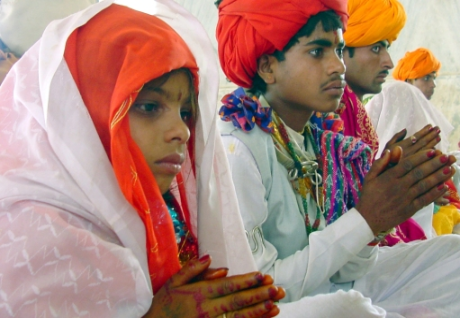In many remote places of Rajasthan one would witness a function occasionally. A queue of small and cute children (not more than 5 years of age) waiting and wailing with their fathers. The boys are dressed in baby blue and the girls in baby pink and their faces speak a million words but not of joy or excitement but of fear and nervousness for they have no clue of what awaits them. They are definitely not getting enrolled to any kindergarten classes (if that what’s you are thinking). Rather they are going to get married.
Child marriage is an age-old tradition, rather a disgusting one that is practiced in many states in India. Besides Rajasthan, Madhya Pradesh, Uttar Pradesh, Haryana, Bihar are to name a few. Innocent children are married off by their uneducated and poverty driven parents when they should be playing with toys and going to school. Little boys and girls are forced into the institution of marriage even before knowing what it means there by extinguishing the tiniest flames of ambitions and aspirations in them.
For parents getting their little ones married is having one mouth less to feed. Apparently raising a daughter is considered as a burden for a family. Where poverty is acute, giving a daughter in marriage allows parents to reduce family expenses by ensuring they have one less person to feed, clothe and educate. In communities where a dowry or ‘bride price’ is paid, it is often welcome income for poor families; in those where the bride’s family pay the groom a dowry, they often have to pay less money if the bride is young and uneducated. That is how the doors of education shut close on the faces of these children.
In remote places of central India where prostitution and physical or sexual assault are a common practice more than an offence parents feel that their children are protected and is ensured safety in their new home once they get married.
The families of prospective couple casually meet at tea to chat over the possibility of a marital alliance. The elders finally decide after the boy who is not less than 12 years of age sees the girl who would be hardly 6 years old and agrees that she is “fit” to be his wife. A wedding is conducted and the child bride is allowed to stay with her parents until she attains puberty. In another ceremony that marks this stage of her life she shifts to her husband’s home. In countries like Bangladesh it’s even worse; the child bride is taken right away.
According to Indian law the permissible age for marriage for men and women is 21 years and 18 years respectively. In order not to mess up with the laws of the land the groom is dressed up such that he looks 21 on the wedding day. The bride’s face is covered in a veil inside which she howls in despair. Of course these children don’t like to what they are subjected to but this ridiculous tradition of child marriage is never challenged and stays as a norm.
One in every three child brides lives in India. These young girls are not only burdened with traditions, responsibilities, childbirth, child rearing, and domestic chores but also tortured in the name of domestic and sexual violence, thus making child marriage truly a violator of human rights. Since they are less informed about reproductive issues and childbirth maternal deaths are on the rise.
Even infants born to mothers under the age of 18 years are more likely to die in their first year. If the infants survive, they are the most likely to suffer from low birth weight, malnutrition, and delayed or stunted physical and cognitive development.
Illiterate mothers can’t afford to help their daughter owing to a pathetic explanation – “Even I went through all of this so she has to go through the same”.
This deep rooted traditional practice of child marriage has been happening since generations. Whoever chooses to challenge it would be excluded from the community. That’s the reason why it is endure in silence by many. As per Graça Machel, widow of Nelson Mandela, traditions are made by people – we can change them. Can’t we?
Watch more here:











